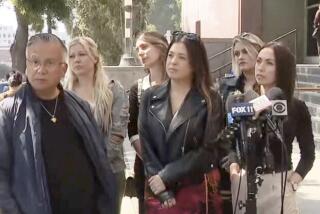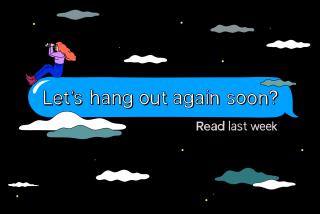Grindr was the first big dating app for gay men. Now it’s falling out of favor
Jesús Gregorio Smith spends more time thinking about Grindr, the gay social media app, than most of its 3.8 million daily users. An assistant professor of ethnic studies at Lawrence University, Smith’s research frequently explores race, gender and sexuality in digital queer spaces — ranging from the experiences of gay dating app users along the southern U.S. border to the racial dynamics in BDSM pornography. Lately, he’s questioning whether it’s worth keeping Grindr on his own phone.
Smith, who’s 32, shares a profile with his partner. They created the account together, intending to connect with other queer people in their small Midwestern city of Appleton, Wis. But they log in sparingly these days, preferring other apps such as Scruff and Jack’d that seem more welcoming to men of color. And after a year of multiple scandals for Grindr — from a data privacy firestorm to the rumblings of a class-action lawsuit — Smith says he’s had enough.
“These controversies definitely make it so we use [Grindr] dramatically less,” Smith says.
By all accounts, 2018 should have been a record year for the leading gay dating app, which touts some 27 million users. Flush with cash from its January acquisition by a Chinese gaming company, Grindr’s executives indicated they were setting their sights on shedding the hookup app reputation and repositioning as a more welcoming platform.
Instead, the Los Angeles-based company has received backlash for one blunder after another. Early this year, the Kunlun Group’s buyout of Grindr raised alarm among intelligence experts that the Chinese government might be able to gain access to the Grindr profiles of American users. Then in the spring, Grindr faced scrutiny after reports indicated that the app had a security issue that could expose users’ precise locations and that the company had shared sensitive data on its users’ HIV status with external software vendors.
This has put Grindr’s public relations team on the defensive. They responded this fall to the threat of a class-action lawsuit — one alleging that Grindr has failed to meaningfully address racism on its app — with “Kindr,” an anti-discrimination campaign that skeptical onlookers describe as little more than damage control.
The Kindr campaign attempts to stymie the racism, misogyny, ageism and body-shaming that many users endure on the app. Prejudicial language has flourished on Grindr since its earliest days, with explicit and derogatory declarations such as “no Asians,” “no blacks,” “no fatties,” “no femmes” and “no trannies” commonly appearing in user profiles. Of course, Grindr didn’t invent such discriminatory expressions, but the app did enable their spread by allowing users to write virtually whatever they wanted in their profiles. For nearly a decade, Grindr resisted doing anything about it. Founder Joel Simkhai told the New York Times in 2014 that he never intended to “shift a culture,” even as other gay dating apps such as Hornet made clear in their communities guidelines that such language would not be tolerated.
“It was inevitable that a backlash would be produced,” Smith says. “Grindr is trying to change — making videos about how racist expressions of racial preferences can be hurtful. Talk about too little, too late.”
Last week Grindr again got derailed in its attempts to be kinder when news broke that Scott Chen, the app’s straight-identified president, may not fully support marriage equality. While Chen immediately sought to distance himself from the comments made on his personal Facebook page, fury ensued across social media, and Grindr’s biggest competitors — Scruff, Hornet and Jack’d — quickly denounced the news. Some of the most vocal criticism came from within Grindr’s corporate offices, hinting at internal strife: Into, Grindr’s own web magazine, first broke the story. In an interview with the Guardian, chief content officer Zach Stafford said Chen’s comments did not align with the company’s values.
Grindr did not respond to my multiple requests for comment, but Stafford confirmed in an email that Into reporters will continue to do their jobs “without the influence of other parts of the company — even when reporting on the company itself.”
It’s the last straw for some disheartened users. “The story about [Chen’s] comments came out and that pretty much finished my time using Grindr,” says Matthew Bray, a 33-year-old who works at a nonprofit in Tampa, Fla.
Concerned about user data leaks and irritated by a plethora of pesky ads, Bray has stopped using Grindr and instead spends his time on Scruff, a similar mobile dating and networking app for queer men.
“There are less problematic options out there, so I’ve decided to use them,” Bray says.
A precursor to modern dating as we know it, Grindr helped pioneer geosocial-based dating apps when it launched in 2009. It maintains one of the largest queer communities online, offering one of the only ways gay, bi and trans men can connect in corners of the world that remain hostile to LGBTQ rights.
But nearly 10 years on, there are signs that Grindr may be losing ground in a dense field of competing apps that offer similar services without all the baggage.
“It still feels like an app from 2009,” says Brooks Robinson, a 27-year-old marketing professional in Washington, D.C. “When Grindr came on the scene, it was a huge breakthrough, especially for people like me who were closeted at the time. Other apps seemed to have taken what Grindr did, but make it better.”
Robinson now prefers meeting people on Scruff, which he says has a friendlier interface and far fewer “headless horsemen,” those infamous dating app users who upload only a faceless photo of a toned torso. Unsurprisingly, Scruff tries to distance itself from Grindr every chance it can — claiming to be a safer and more reliable option. It’s a message that resonates.
“I think the transparency helps with safer sex and less risky behaviors in general,” Robinson tells me. “Grindr acted too slow in responding to what was happening and being encouraged on the app.”
In the past several years, Grindr users have widely reported that spambots and spoofed accounts run rampant — raising safety concerns in a community that’s often victim to violent hate crimes. “Grindr made stalking someone a little too easy,” says Dave Sarrafian, a 33-year-old artist and barista in Los Angeles who says the company’s most recent troubles have crossed a red line for him. “I trust it much less and would never use it again.”
And these are not unfounded concerns. In 2017, for example, one New York City resident filed a lawsuit against Grindr for failing to stop a spoofer who had stolen his identity, created Grindr accounts with his photos, and sent hundreds of strangers seeking sex to his home and workplace. He claims he contacted Grindr support services more than 50 times and received nothing but automated emails in response.
Many users have similar, though less extreme, stories. Since having his own photos stolen and shared on the app, 28-year-old Edwin Betancourt infrequently logs into his Grindr account. “While the security concerns and user [data] leakage would make any user skeptical about [Grindr], I’ve been more concerned with safety,” says Betancourt, a writer in New York City. “You never know if the person you’re talking to is even who they say they are.”
Betancourt quickly learned he needed to take precautionary steps to stay safe and avoid phishing scams — going as far as asking some guys to write a specific word on a piece of paper and then take a picture of themselves posing with it. It’s not an ideal way of meeting a potential match, which is why he opts more often to use OkCupid, Tinder and Chappy, a newer dating platform for queer men that’s backed by Bumble.
“No matter how Grindr advertises their new ‘Kindr Grindr,’ it will never help ease a gay man’s concern for his safety, especially since, unlike Tinder, they don’t require a cellphone number to ensure we are in fact real users,” Betancourt says.
While a level of dating-app fatigue may be expected given that same-sex couples overwhelmingly meet online, Grindr is in a uniquely negative position: Earlier this year, a massive study by the Center for Humane Technology found that Grindr is the No. 1 app that leaves users feeling unhappy. Among its major competitors, Grindr has the lowest score on the Apple App store, a lowly two stars. Unhappy users are seeing little incentive to stay put when there are so many other options.
“[Grindr] could have done more in the past to make the space more democratic and less racist, anti-fem and fat-phobic,” Smith says. “Now they are playing catch up to more progressive apps.”






